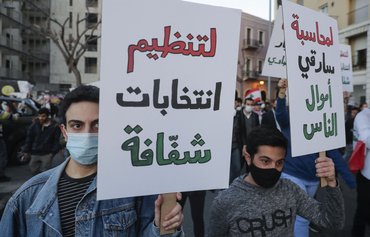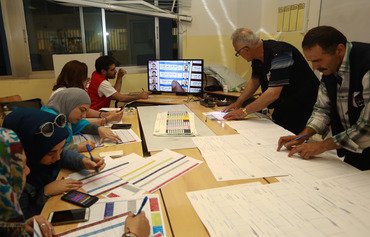A new study on the impact of sectarianism on the voting patterns of Lebanese youth aims to shed light on this issue and help government officials and civil society leaders foster citizenship among young voters.
The study of first-time voters was conducted by the Adyan Foundation's Rashad Centre for Cultural Governance in March 2018, with a sample of 1,000 youth between the ages of 21 and 28 from across the country.
Of the respondents, 50.8% said they took part in the parliamentary elections, the majority of whom (28.9%) said they did so because their political party ran.
The study results were announced at a January 24th seminar, "The role of Lebanese youth in political life: The impact of sectarianism and the pursuit of change", held at the Gefinor Rotana Hotel in Beirut.
The study reported that 37.4% of participants said the main reason they used the preferential vote -- meaning a voter can only select a slate in full, with a preferential vote for a single candidate -- was "to elect a qualified candidate".
Meanwhile, 28.9% said they voted along political party lines.
The study also reported that 51.7% of participants said the new electoral law, which is based on proportional representation, is better than the previous one.
Seminar participants concluded it is in the interest of the Lebanese public to cast aside the sectarian framework in favour of citizenship that embraces diversity, and for civil society to have a more active role.
Addressing political sectarianism
The seminar was held against the backdrop of the 2016 municipal elections and the May 6th, 2018 parliamentary elections, "which saw a high degree of participation by all spectra of civil society", said Adyan president Fadi Daou.
The opinion poll on the impact of sectarianism on the choices of Lebanese youth "showed increased conviction in their active role in political life and Lebanese society’s need for change", he told Al-Mashareq.
The Adyan Foundation seeks to examine the political issues and the role of youth in political life, the impact of sectarianism and the pursuit of change, in order to clarify all those concepts, he explained.
The goal is to "discard political sectarianism for an evolved political system that is based on citizenship", Daou said.
The foundation also aims to "impress upon political decision makers and the public opinion the importance of citizenship that embraces diversity", he said.
It seeks to "open a direct and bold discussion between politicians, civil society and academics on topics that they used to be afraid to raise", he added.
This would include the role of civil society organisations in effecting political change, and how to rid the country of political sectarianism while preserving a multiparty political system, Daou said.
'Urgent need for political change'
Achieving political change away from sectarianism requires "awareness raising, holding people in power accountable and non re-election of [partisan] leaders", Lebanese MP Paula Yacoubian told Al-Mashareq.
Lebanon's parliament in 2010 rejected a bill that called for the voting age to be lowered from 21 to 18, and postponed an agreement to lower the voting age in 2018.
This has left youth "apathetic to elections and political action, which makes effecting change difficult", Assem Shaia, executive director of the organisation Advanced Democracy for Sustainable Peace, told Al-Mashareq.
"There is an urgent need for political change, which begins with civil society," Gilbert Doumit, an expert on institutional development and social and economic development, told Al-Mashareq.
Doumit is a founding member of the Li Baladi (For My Country) coalition. He also serves as a member of Beirut Madinati (Beirut My City), a volunteer-led political campaign which participated in the 2018 parliamentary elections with the Kollouna Watani (We Are All Patriots) electoral list.
Civil society organisations must continue to "organise ourselves, clarifying our relationship with citizens, conducting research and coming up with innovative alternative solutions to political problems in the pursuit of change", he said.
"After having gone through the elections experience, much is required of us now to assure people that we want to run the country ethically and competently, so we are continuing to pursue change," he said.

![The Adyan Foundation's Rashad Centre for Cultural Governance held a January 24th seminar on the role of Lebanese youth in political life at the Gefinor Rotana Hotel in Beirut. [Nohad Topalian/Al-Mashareq]](/cnmi_am/images/2019/02/22/16629-Lebanon-Beirut-seminar-600_384.jpg)






